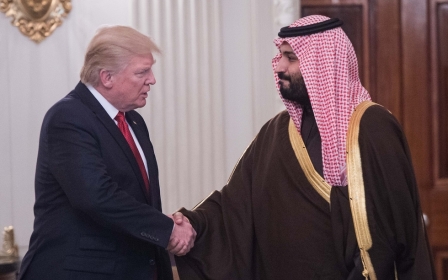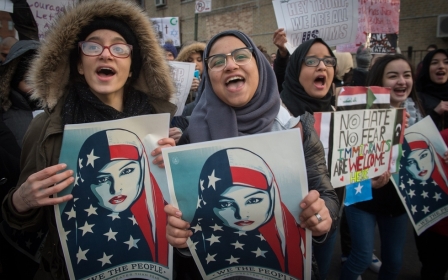'Muslim ban' removed from Trump's campaign website after reporter's question
The controversial Muslim ban proposal was removed on Monday from the campaign website of US President Donald Trump months after two executive orders barring citizens of several Muslim-majority countries were stalled by legal challenges.
The Trump administration had argued that the travel restrictions were necessary national security measures, not a "Muslim ban". Earlier on Monday, White House Press Secretary Sean Spicer fended off a question by an ABC reporter about the Muslim ban statement that was still on Trump’s campaign website.
In December 2015, after a deadly militant attack in Paris claimed by the Islamic State (IS) group, then-candidate Trump called for “a total and complete shutdown of Muslims entering the United States”.
When Trump signed a 27 January executive order banning the entry of citizens from Yemen, Somalia, Iran, Iraq, Syria, Sudan and Libya, including permanent US residents, it was seen as an implementation of his campaign promise.
But when challenged in courts on grounds of religious discrimination, the administration denied that the executive order is faith-based.
“If this White House is no longer calling this a Muslim ban, as the president did initially, why does the president’s website still explicitly calls for 'preventing Muslim immigration?'" ABC News' Cecilia Vega asked Spicer.
Vega later tweeted that the statement was taken down from Trump's website minutes after her question.
After the executive order was suspended by US courts, Trump issued another decree with a more limited scope. The second executive order was also halted by federal judges in Hawaii and Maryland.
The new ban excluded Iraq and dropped directives for preferential treatment for religious minorities seeking refugee status in the US.
At an appeals hearing on Monday, the US Justice Department stressed that the executive order does not target Muslims.
"This is not a Muslim ban," Acting Solicitor General Jeffrey Wall, arguing for the government, told the judges of the Virginia-based 4th US Circuit Court of Appeals.
The judges on Monday peppered Wall with tough questions about the executive order, with several voicing skepticism that protecting national security was the aim of the policy, not religious bias.
"He's never repudiated what he said about the Muslim ban," Judge Robert King, referring to Trump's campaign promise.
Judge Pamela Harris said Trump's action clearly had a disparate impact on Muslims, asking, "How is this neutral in its operation as to Muslims?"
Judge Barbara Keenan, who like Harris was appointed by former president Barack Obama, said the order could affect some 200 million people.
However, Wall told the judges that past legal precedent holds that the court should not look behind the text of the Trump's executive order, which does not mention any specific religion, to get at its motivations.
Judge Paul Niemeyer, appointed by former president George HW Bush, told Omar Jadwat, the American Civil Liberties Union lawyer representing the plaintiffs who challenged the order, that they were asking the judiciary to second guess a president's national security judgments.
'A Constitutional concern'
Meanwhile, former acting attorney general Sally Yates defended on Monday her decision not to defend the travel ban in court. Yates was fired by Trump for her decision.
At a congressional hearing for the Senate judiciary subcommittee, which is investigating Russian interference in US elections, Senator Ted Cruz, a Republican, read to Yates a federal statute that gives the president broad powers over restriction immigration, asking if it would be a "good idea" for the attorney general to defy the president's orders.
Yates said she is familiar with the law, but she cited a provision of the Immigration and Nationality Act (INA) that prohibits discrimination in the issuance of visas.
"And that’s been part of the discussion with the courts with respect to the INA is whether this more specific statute trumps the first one that you just described," Yates told Cruz. "But my concern was not an INA concern here. It rather was a constitutional concern, whether or not the executive order here violated the constitution specifically with the establishment clause and equal protection and due process."
New MEE newsletter: Jerusalem Dispatch
Sign up to get the latest insights and analysis on Israel-Palestine, alongside Turkey Unpacked and other MEE newsletters
Middle East Eye delivers independent and unrivalled coverage and analysis of the Middle East, North Africa and beyond. To learn more about republishing this content and the associated fees, please fill out this form. More about MEE can be found here.




